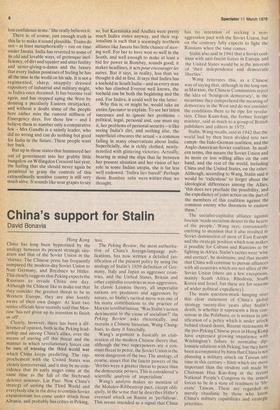China's support for Stalin
David Bonavia
liong Kong China has long been hypnotised by the analogy between its present strategic situation and that of the Soviet Union in the 'thirties. The Chinese press has frequently compared the modern-day Soviet Union to Nazi Germany, and Brezhnev to Hitler. This clearly suggests that Peking expects the Russians to invade China one day. Although the Chinese like to make out that they consider the greatest threat to be to Western Europe, they are also keenly aware of their own danger. At least two senior officials have recently said that Moscow 'has not given up its intention to finish us off'.
Clearly, however, there has been a difference of opinion, both in the Peking leadership and among China's allies, over the means of staving off this threat and the manner in which revolutionary forces can be sure of winning the third world war which China keeps predicting. The rapprochement with the United States was clearly controversial, and it may be no coincidence that its early stages came at the same time as the fall of the firebrand defence minister, Lin Piao. Now China's strategy of uniting the Third World and everybody else in the drive to contain Soviet expansionism has come under attack from Albania, and probably has critics in Peking, too.
The Peking Review, the most authoritative of China's foreign-language publications, has now written a detailed justification of the present policy by using the analogy of Stalin's 1939 definition of Germany, Italy and Japan as aggressor countries, and the United States, Britain and other capitalist countries as non-aggressors. In classic Leninist theory, all imperialist nations are predators and aggressors by nature, so Stalin's tactical move was one of his many contributions to the practice of Marxist totalitarianism. Was Stalin's action detrimental to the cause of socialism?' the Peking Review asks rhetorically, and recruits a Chinese historian, Wang Changhuei, to deny it forcefully.
Wang's argument is basically an elaboration of the modern Chinese theory that, although the two superpowers are a constant threat to peace, the Soviet Union is the more dangerous of the two. The analogy, of course, states that the fascist powers of the 'thirties were a greater threat to peace than the democratic powers. This is considered 'a scientific analysis of imperialism'.
Wang's analysis makes no mention of the Molotov-Ribbentrop pact, except obliquely, in the sense that he describes Hitler's eventual attack on Russia as 'perfidious'. This seems intended as a signal that China has no intention of seeking a nonaggression pact with the Soviet Union, but on the contrary fully expects to fight the Russians when the time comes.
Stalin also said in 1941 that a Soviet coalition with anti-fascist forces in Europe and the United States would be in the interests of 'their independence and democratic liberties'.
Wang reiterates this, as a Chinese way of saying that, although in the long run, as Marxists, the Chinese Communists reject the idea of 'bourgeois democracy', in the meantime they comprehend the meaning of democracy in the West and do not consider the conditions there to be ripe for revolution. Chiao Kuan-hua, the former foreign minister, said as much to a group of British publishers and editors in 1975.
Stalin, Wang recalls, said in 1942 that the world. had by then been divided into two camps: the Italo-German coalition, and the Anglo-American-Soviet coalition. In modern terms, this means the Soviet Union and its more or less willing allies on the one hand, and the rest of the world, including China and the United States, on the other. Although, according to Wang, Stalin said it would be 'ridiculous' to forget about the ideological differences among the Allies, 'this does not preclude the possibility, and the expediency of joint action on the part of the members of this coalition against the common enemy who threatens to enslave them.'
The socialist-capitalist alliance against fascism 'made socialism dearer to the hearts of the people,' Wang says, conveniently omitting to mention that it also resulted in Soviet domination of most of East Europe and the strategic position which now makes it possible for Cubans and Russians to be fighting in Africa. Stalin's tactics were 'wise and correct', he maintains, and that means that China will continue to pursue alliances with all countries which are not allies of the Soviet Union (there are a few exceptions. mainly South Africa, Rhodesia, South Korea and Israel, but these are for reasons of wider political expediency). The main question-mark hanging over this clear statement of China's global strategy twenty-five years after Stalin's death, is whether it represents a firm consensus in the Politburo, or is written in justification of a policy which is under attack behind closed doors. Recent statements in the pro-Peking Chinese press in Hong Kong have expressed growing impatience with Washington's failure to nordalise diplomatic relations with Peking, but they have been accompanied by hints that China is not planning a military attack on Taiwan any time in this century — hints which are more important than the strident call made bY Chairman Hue Kuo-feng at the recent National People's Congress to the armed forces to be in a state of readiness to 'liberate' Taiwan. These are regarded as merely ritualistic by those who know China's military capabilities and strategic priorities.


































 Previous page
Previous page